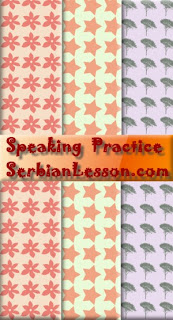Here comes a sample video exercise of a very basic and simple text in Serbian, much much easier than the previous ones:
Anyway, I think this is a good example how you can practise making natural sentences in Serbian on your own, simply by reading together with me and supplying the words which are missing. You can also do the follow-up exercise in writing.
Sorry for the poor audio quality - I'll try to fix it somehow !
- About Jeremy in the Latin alphabet
- About Jeremy in Serbian Cyrillic script
- About Jeremy's wife
- Again about Jeremy's wife
Anyway, I think this is a good example how you can practise making natural sentences in Serbian on your own, simply by reading together with me and supplying the words which are missing. You can also do the follow-up exercise in writing.
Sorry for the poor audio quality - I'll try to fix it somehow !

.png)
















